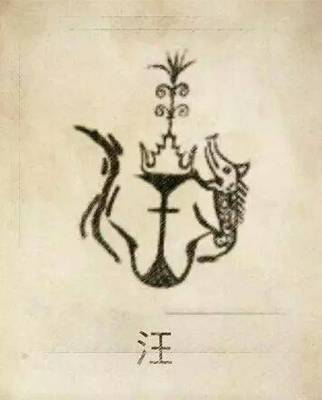The Wang (wāng) surname is one of China's oldest and most culturally rich family names, with origins tracing back to ancient times. As a significant part of Chinese surnames, the Wang family not only carries profound historical memories but also showcases unique cultural charm in modern society.

Ⅰ、Origins of the Wang Surname
1. Descendants of the Wangmang Tribe
The primary origin of the Wang surname is linked to the ancient Wangmang Tribe (also known as the Wangwang Tribe). During the Xia and Shang dynasties, this tribe thrived in southeastern China. Their descendants adopted "Wang" as their surname. According to historical records, the Wangmang Tribe was descended from Fangfengshi, a legendary figure who assisted Yu the Great in flood control. As a reward, Fangfengshi was granted the land of Wangmang (modern-day Wukang, Zhejiang), and his descendants took "Wang" as their surname.
2. The Ji Lineage Branch
Another branch of the Wang surname originates from the Ji lineage. During the Spring and Autumn Period, Man, the son of Duke Cheng of Lu, was granted the fiefdom of Wang (in modern-day Shandong). His descendants adopted "Wang" as their surname.
3. Minority groups changing surnames
Throughout history, some ethnic minorities adopted the Wang surname through cultural assimilation. For example, during the Qing Dynasty, Manchu, Mongolian, Yi, and Miao people adopted the Wang surname.
Ⅱ、Historical Figures
1. Ancient Statesmen and Scholars
Wang Hua : A regional leader during the Sui and Tang dynasties, he was revered as the "Emperor Wang" for his efforts in maintaining peace and stability in southern China.
Wang Lun: Immortalized in Li Bai's poem To Wang Lun, he is remembered for his hospitality and the famous line, "Peach Blossom Pool a thousand feet deep, not as deep as Wang Lun's love for me."
Wang Zao: A renowned Song Dynasty writer and historian, known for his literary works and contributions to Chinese literature.
Wang Zhi: A Ming Dynasty navigator who led expeditions to Southeast Asia, contributing to the development of maritime trade.
2. Modern and Contemporary Figures
Wang Zengqi: A celebrated contemporary writer known for his essays and novels. He is often regarded as "the last scholar of traditional Chinese culture."
Wang Daohan: A politician and diplomat who served as the mayor of Shanghai and played a significant role in cross-strait relations.
Ⅲ、Cultural Significance:
1. Ancestral Halls and Clan Mottos
Ancestral Halls:
Prominent ancestral halls include those in Pingyang (Shanxi), Xin'an (Zhejiang), and the "Six Cassia Halls," highlighting the historical significance of these regions to the Wang clan.
Clan Mottos:
Mottos such as "Yueguo Tang" (Hall of the Duke of Yue, inspired by Wang Hua) and "Pingyang Tang" reflect the clan's reverence for ancestral virtues.
2.Generational Naming and Family Teachings
The Wang family emphasizes generational continuity. For example, one branch in Anhui uses the generational names "De Hou Chuan Jia Jiu, Shi Shu Ji Shi Chang" ("Virtue and Generosity Sustain the Family, Poetry and Scholarship Illuminate the Future"), while a Zhejiang branch uses "Zhong Xiao Cheng Xian Zhi, Wen Zhang Qi Hou Kun" ("Loyalty and Filial Piety Inherit Ancestral Wisdom, Literature and Scholarship Inspire Future Generations"). These names embody Confucian ethics and familial aspirations.
Ⅳ、Social Impact:
1. Population Distribution
Today, there are approximately 5.8 million people with the Wang surname. The surname is concentrated in Anhui, Hubei, Jiangsu, Zhejiang, and Sichuan provinces.
Historically, the Wang clan migrated southward during periods of war, spreading to Jiangxi and Fujian during the Song and Ming dynasties. By the Qing Dynasty, they had settled in Taiwan and overseas, forming a global clan network.
2. Modern Contributions
The Wang family has produced leaders in science, business, and media. For example:
Wang You: A pioneer in organic chemistry and a key figure in China's scientific development.
Wang Jian: Founder of BGI (formerly Beijing Genomics Institute), a global leader in genetic research.
Wang Han: A popular TV host known for his cultural depth and charisma.
Conclusion
The Wang surname's thousand-year evolution is a story of political upheaval, cultural preservation, and familial migration. From the ancient Wangmang Tribe to Wang Hua's legacy of peacekeeping, and from ancestral halls to modern philanthropy, the Wang clan embodies the essence of Chinese civilization. Today, they continue to thrive, embracing globalization while honoring their rich heritage.